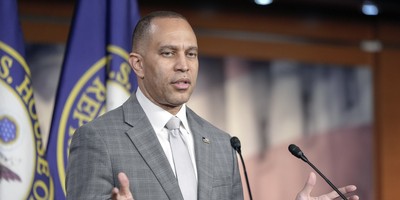Perhaps no real harm can come from Hillary Clinton monetizing her venting about how the FBI director, Russia, Bernie Sanders and misogyny apparently conspired to deny her destined ascension to the presidency.
But, it’s worth recalling that after the third presidential debate last year when then Republican candidate Donald Trump indicated he might not accept the election outcome, his Democratic opponent indignantly called that a “direct threat to our democracy.”
When touting her book, “What Happened,” in an NPR interview, Clinton went a step further than venting.
When asked, “Would you completely rule out questioning the legitimacy of this election if we learn that the Russian interference in the election is even deeper than we know now?” Clinton responded, “No. I wouldn’t rule it out.”
During her NPR interview, Clinton went on to say, “I just don't think we have a mechanism [to challenge the outcome]. You know, the Kenya election was just overturned,” indicating America should follow suit, but there is no way to do it.
Essentially adding the Constitution to her list of co-conspirators, she managed to mention to host Terry Gross, “Now, I do believe we should abolish the Electoral College.”
To hint at challenging an outcome nearly a year after election night would be unprecedented. But whatever she might or might not do, she hasn’t talked about what her campaign surrogates did after the election and before Inauguration Day to prevent President Donald Trump from taking the office he was constitutionally elected to. My book, “The Plot to Stop Trump: The Story of the Failed Effort to Overturn an Election,” explains how Clinton’s campaign workers pushed ridiculous measures behind the scenes, from recounts to pushing an Electoral College coup. It also describes how she kept her fingerprints off.
Recommended
Today Clinton’s goal at least seems to be simply to delegitimize the 2016 election in the mind of the public. But, immediately after the election, the goal was to prevent a duly-elected president from taking office. So, however harmless sore-loser venting is, attempting to overturn an election isn’t.
First came recounts in three states where Trump had toppled the “blue wall.” Clinton’s legal team came on board the effort by Green party candidate Jill Stein to count the votes in Michigan, Pennsylvania and Wisconsin. It’s funny that no one demanded a recount in New Hampshire or Minnesota, states Clinton won a very thin margin.
The 2016 Democratic nominee didn’t say a word, but Clinton campaign lawyer Marc Elias issued an announcement that said: “Now that a recount has been initiated in Wisconsin, we intend to participate in order to ensure the process proceeds in a manner that is fair to all sides. If Jill Stein follows through as she has promised and pursues recounts in Pennsylvania and Michigan, we will take the same approach in those states as well.”
Elias cast it as being along for the ride, but the recount effort was bankrolled primarily by Clinton supporters.
As it turns out, Stein got her recount in Wisconsin. The result: Trump gained 131 more votes.
Courts denied that the Green party candidate had a grievance in Pennsylvania or Michigan, so no recount there. However, a recanvassing of one of the Pennsylvania’s largest counties, Allegheny County, found no changes.
Politico later found that top Clinton campaign aides Jake Sullivan, a chief foreign policy adviser and Jennifer Palmieri, communications director for the campaign, were in contact with the Hamilton Electors—the most prominent of a handful of groups trying to push an Electoral College coup.
It was named for founding father Alexander Hamilton, who, in addition to being a pop culture phenomenon because of the Broadway musical, also had said the Electoral College existed to ensure, “the office of president will never fall to the lot of any man who is not in an eminent degree endowed with the requisite qualifications.”
It’s funny that many of the same folks on the left who criticized the Electoral College for being undemocratic were now willing to turn to it to thwart an election result and even potentially install someone who didn’t run for president to keep Trump out.
The goal of the Hamilton Electors and other groups was to shift 37 Republican electors to vote for someone other than Trump. That’s the number needed to pull Trump below 270 electoral votes—which would send the election to the House of Representatives.
It’s tough to see what the Clinton surrogates’ endgame was? There was an off chance enough House Republicans didn’t want Trump to be president but they certainly wouldn’t vote for Hillary Clinton president.
It’s a reason the Clinton campaign didn’t go all in with challenging the outcome on any front, but it seems highly doubtful campaign staff leaped into these efforts against the wishes of the boss.
Hillary—or enough people around her—accepted that she had no legal leg to stand on in challenging the outcome. Now, she’s reduced to saying if only America were more like Kenya.
While her memoir makes no pretense about being a mature loser, Americans shouldn’t forget what her campaign sought to pull off after the election, particularly when she’s leaving open the option to challenge its legitimacy now.
























Join the conversation as a VIP Member